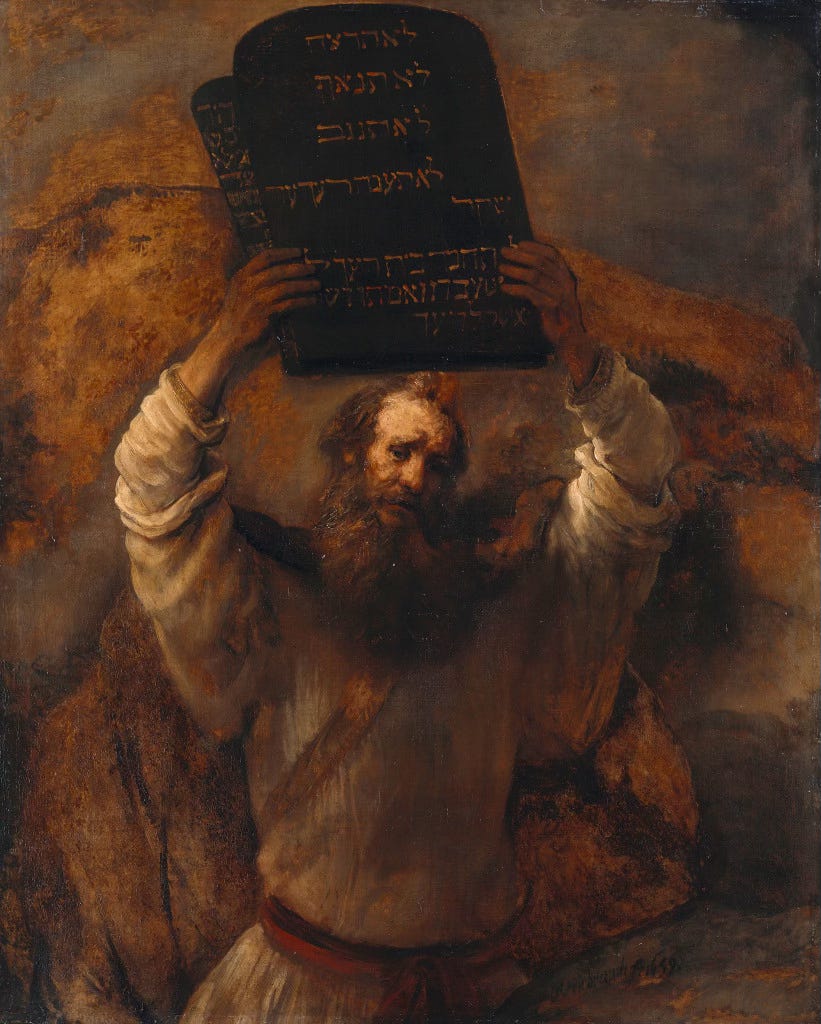
בְּשִׁבְעָה עָשָׂר בְּתַמּוּז נִשְׁתַּבְּרוּ הַלּוּחוֹת, וּבָטַל הַתָּמִיד, וְהֻבְקְעָה הָעִיר, וְשָׂרַף אַפּוֹסְטֹמוֹס אֶת הַתּוֹרָה, וְהֶעֱמִיד צֶלֶם בַּהֵיכָל.
…On the seventeenth of Tammuz the tablets were broken by Moses when he saw that the Jews had made the golden calf; the daily offering was nullified by the Roman authorities and was never sacrificed again; the city walls of Jerusalem were breached; the general Apostemos publicly burned a Torah scroll; and Manasseh placed an idol in the Sanctuary…
Gimme Some Torah #739
Welcome to new subscribers Luiza and David!
Today is Rosh Hodesh Tammuz, the new month of Tammuz. The month of Tammuz is remarkable because it contains no cause for celebration or joy, save for Shabbat. Even the month of Av has one celebratory day, Tu b’Av. Tammuz, by way of contrast, has for millennia been regarded as a time for sadness and mourning.
The period of mourning known as “the three weeks” or בֵּין הַמֵּצָרִים (bein hametzarim, between the narrow straits) begins on the seventeenth of Tammuz, which is a dawn to sunset fast day. Three weeks later is Tisha b’Av, which is a major sunset to nightfall fast day. According to the Mishnah above (M. Tamid 4:6), five terrible things happened to the Jewish people on the seventeenth of Tammuz:
(1) Moses shattered the Tablets of the Law upon seeing the Golden Calf.
(2) The daily Tamid sacrifice of one lamb in the morning and another in the evening was prohibited by the Romans, never to return.
(3) The Romans breached the city walls of Jerusalem, thus allowing them to destroy the Temple three weeks later.
(4) A Greek general named Apostemos publicly burned a Torah scroll.
(5) Manasseh, a wicked Judean king who was Hezekiah’s son, erected an idol in the Sanctuary.
Even the name of the month, Tammuz, is derived from sadness. The names of the Hebrew calendar’s months were borrowed from the Babylonians. Tammuz was the name of a god, one whose followers would cry before it. The god’s eyes were made of lead, and when the lead was heated, it would drip and create the illusion of tears. (See Ezekiel 8:14 and Rashi’s comment.)
If all of these terrible things happened on the 17th of Tammuz, and if the month of Tammuz offers us no joyous days at all, then why do we celebrate Rosh Hodesh Tammuz with every bit of enthusiasm as we welcome any other new month? The liturgy of Rosh Hodesh is the same no matter what month we honor: Hallel, a special Torah reading with four aliyot, and a Musaf.
I can think of two reasons:
(1) Rosh Hodesh does not celebrate the entire month. It is only a celebration of the new moon, i.e. the beginning of the month. It’s an astronomic observance of the fact that we have yet again witnessed the moon wax and wane through its cycles. When the moon disappears completely, the new moon has arrived. It is observed as kind of minor Yom Kippur, a day equally devoted to joy and contemplation
(2) Being alive is good. It may not always be enjoyable and it may actually be quite painful or terrifying. Nonetheless, I argue that being alive is always better than not existing. If there is even one person who loves you on a personal level, your life is priceless and filled with meaning. Therefore, we celebrate the passage of time irrespective of the month’s mood or our own.
Think of it this way: Once we get to the 17th of Tammuz, there are only 10 weeks left until the celebration of the New Year, Rosh Hashanah, so there is indeed a reason to be happy. (Oops, did I just stress you out? 🤣)
Hodesh Tov! Happy New Month!
Shabbat Shalom! GST will return on Monday morning!
•••
Thank you so much for reading Gimme Some Torah! If you can afford to purchase a paid subscription, please do—paid subscribers get access to the entire GST library!
I am the rabbi of Temple Beth El in Somerset, New Jersey, and the author of The JPS Jewish Heritage Torah Commentary.


